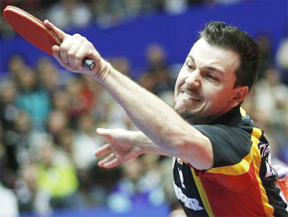LONDON, (Reuters) – German table tennis player Timo Boll has learnt Mandarin, studied Chinese playing techniques and attracted an army of female admirers in China; all he needs to do now is beat the Chinese at their own game at the Olympics.

The former world number one has already unsettled the Chinese team enough for them to hire training partners who play in a similar style to Boll, to prepare their contenders for meeting the German.
His quest to break Chinese dominance in the sport is a difficult one: China have won 20 of the 24 golds on offer since table tennis joined the Olympics in 1988.
New qualifying rules, though, may help the European number one as each country is limited to a maximum of two singles players at the London Games in July and August.
In Beijing, when each nation was allowed three singles competitors, China swept the men’s and women’s singles medals.
With the top five men in the world rankings Chinese, but only two allowed to play in London, world number six Boll will be the third seed for the competition.
The favourite is likely to be world number one Zhang Jike.
At 31, left-hander Boll will be competing at his fourth Olympics. He won a team silver in Beijing but has disappointed at major singles tournaments in the past and his best Olympic singles showing was fourth in Athens in 2004.
He did, though, break his jinx of failing to get on the podium when he won a singles bronze at last year’s world championships in Rotterdam.
Boll, born in the southern German town of Erbach, started playing at the age of four, trained by his father. Eleven years later he became the youngest ever German league player.
He has been Europe’s top player for a decade and has five European singles titles. He also won a Fair Play award in 2005 after correcting a referee’s wrong decision in favour of his opponent.
Now living in a Bavarian-style country house near Frankfurt and playing for Borussia Duesseldorf, he typically plays table tennis for 2-1/2 hours each morning, followed by lifting weights, riding his bike in the woods or other fitness work.
In his free time, he watches films, plays with his dog and cat, or walks with his wife of nine years, Rodelia Jacobi. He also enjoys diving and golf.
Boll has twice been runner-up as German Sportsman of the Year – in 2007 and 2010 – but struggles to match the popularity at home of top names in soccer, motor racing and basketball.
He is probably better known in China, where he travels and competes regularly, and he has studied Chinese table tennis strategy, which he has described as high-speed chess, using tactics, surprise and psychology.
Boll, whose aggressive top-spin forehand is his most dangerous weapon, took the world number one ranking in 2003 and again last year, rare breaks in the Chinese dominance at the top, and has won respect in Asia as a European who can challenge the top players in the sport.
A favourite with female fans in China, he published a book last year about his time in the country.
“Sometimes I feel a bit like a rock star in China,” he said, though his popularity may be severely tested if he beats the Chinese players to gold in London.
